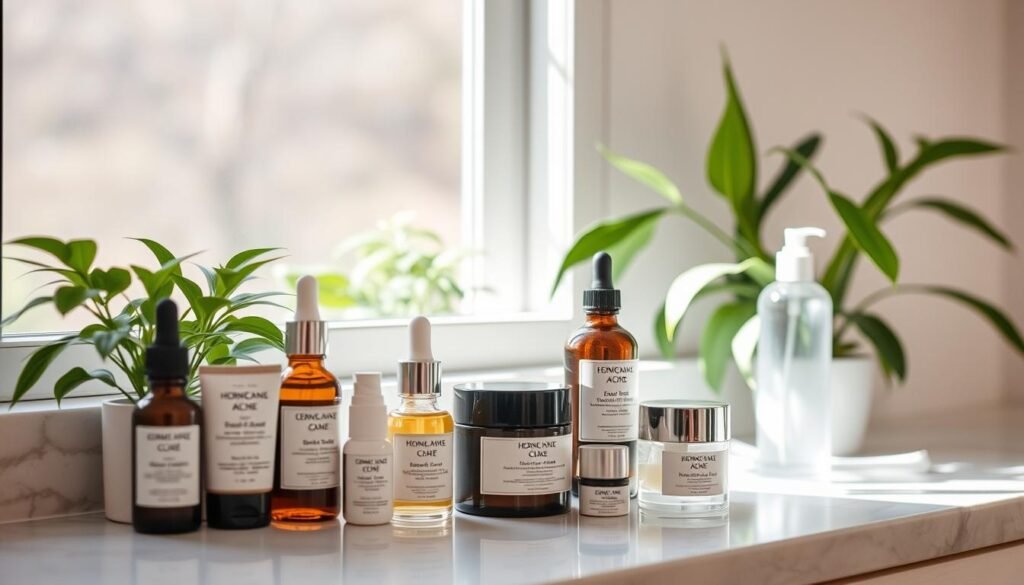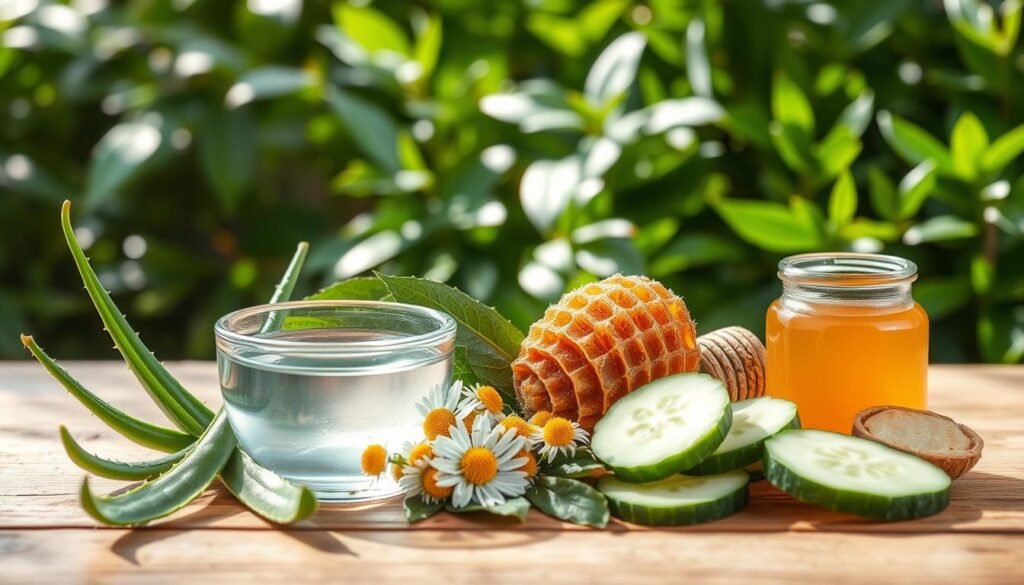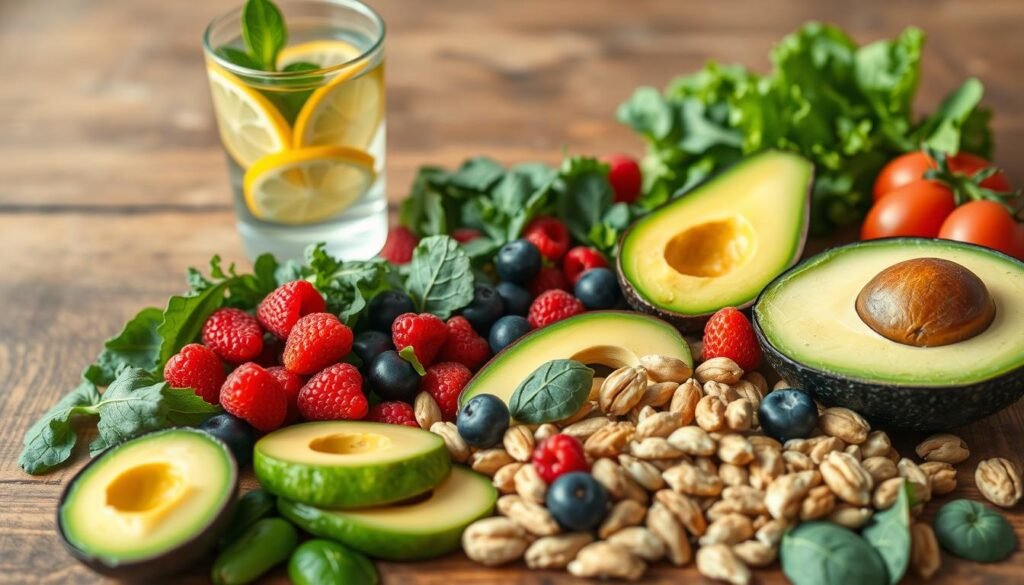Did you know more and more women in their 30s, 40s, and 50s are getting hormonal acne? This fact highlights the ongoing battle many have with this condition. It’s linked to changes in hormones. Hormonal acne can hit at any age, often appearing during puberty, menstruation, and menopause. Understanding the causes of hormonal acne is key. We need to find effective solutions to bring back clear skin. In this piece, we’ll look at both traditional and natural treatments. We cover medications, both topical and oral, and lifestyle changes that can help. For more on tackling this widespread issue, see Healthline’s guide to hormonal acne.
Key Takeaways
- Hormonal acne affects people at different stages in life because of hormone level changes.
- Traditional treatments include topical and oral medications, useful for severe cases.
- Natural remedies like tea tree oil and green tea extract can help manage symptoms.
- Making changes to your diet is key in controlling hormonal acne.
- Seeing dermatologists for custom treatment plans is smart.
Understanding Hormonal Acne
Hormonal acne is a type of acne tied to changes in the body’s hormones. It affects people of all ages, especially those assigned female at birth. To understand this condition, it’s crucial to know its signs, who it affects, and what triggers it.
What is Hormonal Acne?
This condition appears when hormone levels shift, especially androgens. High androgens cause more oil production, leading to clogged pores and acne. On the other hand, estrogens help control oil production. Balancing these hormones is key to managing hormonal acne.
Who Can Be Affected?
Anyone can experience hormonal fluctuations, but hormonal acne is common among females. It’s seen during puberty, menstruation, pregnancy, and menopause. Factors like genetics, environment, and lifestyle choices also influence hormonal acne.
Hormonal Triggers
Various triggers can worsen hormonal acne. Changes during the menstrual cycle, pregnancy, or with hormonal contraceptives can cause issues. Stress can raise androgen levels and increase acne. Additionally, certain medications, smoking, and high-GI foods can make this condition worse.
Common Causes of Hormonal Acne
Hormonal acne comes from many things that upset the skin’s natural balance. Understanding these causes helps in preventing and managing it well.
Hormonal Changes During Puberty
Puberty brings a big increase in hormones that affect the skin. More androgens cause more sebum, which often leads to acne. This time is key for many as they face their first major outbreaks of acne.
Menstrual Cycle Impact
The menstrual cycle also brings hormonal changes that can affect acne. Hormone levels change, leading to acne before periods. Knowing about the Menstrual Cycle and skin health is important for handling this issue.
Other Contributing Factors
Other things can contribute to hormonal acne too. Stress can lead to more oil and breakouts. Bad diet choices, like too much sugar, can also affect acne. Plus, conditions like PCOS and menopause bring big hormonal changes, causing ongoing acne problems.
Hormonal Acne: Traditional Treatments, Natural…
Hormonal acne requires different approaches, including traditional treatments and lifestyle changes. Traditional methods often use medicines addressing hormone fluctuations. These are key in combating this skin issue.
Topical Medications
Topical Medications are often the starting point for those with hormonal acne. Salicylic acid and benzoyl peroxide are effective in reducing inflammation and cleaning pores. Retinoids also help by speeding up skin renewal and preventing blocked follicles. These options work well for mild to moderate acne, particularly on the chin and jawline.
Oral Medications
Severe cases may need Oral Medications when topicals don’t work. Hormonal contraceptives and anti-androgens like spironolactone are common. They adjust menstrual cycles and lower androgen levels, reducing oil production. It’s vital to know the causes of your acne. This helps in choosing the right oral medication.
Combination Treatments
Combination Treatments can offer better results by mixing topical and oral strategies. This method fights acne on multiple fronts. It also includes lifestyle changes such as diet and stress control. Addressing overall health can lead to better skin and more self-confidence.

Natural Remedies for Hormonal Acne
For those seeking to treat hormonal acne naturally, several methods are available. These range from herbal treatments and essential oils to changes in diet. These approaches offer a different way to improve skin health and manage breakouts.
Herbal Treatments
Herbs can be very effective against hormonal acne. One example is spearmint tea, which might lower androgen levels that cause acne. Additionally, clay face masks with jojoba oil could improve acne by 54%, a 2012 study found. Aloe vera used with ultrasound has also reduced skin bumps and lesions, showcasing natural remedies’ power.
Essential Oils
Essential oils are great for battling acne. Tea tree oil, with its antimicrobial properties, can significantly lessen acne sores. A 2019 review supported the benefits of tea tree oil in acne treatment. Rosemary extract is another excellent choice because it fights inflammation from acne bacteria. These oils can clear up skin and reduce inflammation when added to your skincare.
Dietary Adjustments
Changing your diet can influence hormonal balance and acne. By eating fewer high glycemic and dairy products, you might avoid some breakouts. Focusing on whole, nutritious foods is key for healthy skin. Foods high in zinc, known for their anti-inflammatory effects, can help lower acne occurrence. Implementing these dietary changes can gradually improve the clarity of your skin.

The Role of Diet in Hormonal Acne
Diet plays a big role in hormonal acne. What you eat can affect your hormones and skin. Knowing which foods to avoid and eat can really help those with acne.
Foods to Avoid
High-glycemic foods like white bread, pastries, and sugary snacks can make insulin levels spike. This could make hormonal acne worse. Your body makes more acne-linked hormones when you eat these foods. Also, dairy products like milk and cheese might increase acne risk by affecting hormones. Whey protein in supplements can trigger acne for some.
Beneficial Foods to Include
Adding good foods to your diet can help with hormonal acne. Fatty foods rich in omega-3 fatty acids, such as fatty fish, chia seeds, and walnuts, are great. They reduce inflammation and improve skin health. Eating foods full of antioxidants, like various fruits and vegetables, helps fight inflammation and stress. A diet with whole grains, legumes, and healthy fats is good for balancing hormones and keeping skin clear.

| Foods to Avoid | Beneficial Foods |
|---|---|
| High-GI foods (e.g., white bread, pastries) | Fatty fish (e.g., salmon, mackerel) |
| Dairy products (e.g., milk, cheese) | Fruits (e.g., berries, oranges) |
| Whey protein supplements | Vegetables (e.g., spinach, kale) |
| Sugary snacks | Whole grains (e.g., brown rice, quinoa) |
| Refined carbs | Legumes (e.g., lentils, chickpeas) |
Building an Effective Skin Care Routine
Starting a good skin care routine is key for managing hormonal acne. It’s important to cleanse, moisturize, and protect your skin from the sun. This helps create healthier skin and reduce breakouts.
Importance of Cleansing
Cleansing is the first step, especially if you have hormonal acne. Use a gentle cleanser twice a day. It keeps your skin clean and lowers the chance of pores getting blocked. A cleanser with salicylic acid is even better. It helps by exfoliating and fighting bacteria.
Moisturizing Strategies
Don’t forget to moisturize. It’s crucial for keeping your skin hydrated and balanced. Choose moisturizers that won’t cause breakouts. Hyaluronic acid is great for deep hydration without blocking pores. Regular moisturizing can make your skin smoother and more stable through hormone changes.
Sun Protection
Sun protection is super important. Treatments for acne can make your skin more sensitive to the sun. Use a broad-spectrum sunscreen to guard against UV rays. It also prevents dark spots after inflammation. Make putting on sunscreen a daily habit for lasting skin health.
| Step | Description | Key Ingredients |
|---|---|---|
| Cleansing | Remove impurities and excess oil | Salicylic acid, gentle foaming agents |
| Moisturizing | Hydrate skin without clogging pores | Hyaluronic acid, glycerin |
| Sun Protection | Shield skin from UV damage | Broad-spectrum SPF 30 or higher |
Keep up with these steps for better skin. They make an effective plan against hormonal acne. And they lead to healthy, clear skin.
Anti-Inflammatory Approaches
Making anti-inflammatory choices every day can really help if you’re dealing with hormonal acne. These choices include what you eat and how you handle stress. Both play a key role in fighting inflammation in your body.
Benefits of Omega-3 Fatty Acids
Omega-3 fatty acids are famous for fighting inflammation. Eat foods high in Omega-3 like fatty fish, walnuts, and flaxseeds to fight inflammation. This can make your acne less severe. Eating these foods is good for your skin and helps with acne.
Stress Management Techniques
Managing stress well is important for keeping hormones balanced. Activities like mindfulness and yoga can make you less stressed. This could mean fewer acne outbreaks. Using these relaxation techniques improves your overall health and helps your skin.
| Strategy | Description | Benefits |
|---|---|---|
| Dietary Changes | Incorporating Omega-3 rich foods. | Reduces inflammation and improves skin health. |
| Mindfulness | Practices such as meditation and deep breathing. | Lowers stress levels, aiding hormonal balance. |
| Yoga | Physical postures combined with breath control. | Enhances relaxation and reduces androgen production. |
Consulting Professionals for Hormonal Acne
When dealing with stubborn hormonal acne, it’s key to consult professionals. A dermatologist is crucial for diagnosing and recommending treatments. These treatments are personalized for each person’s needs.
Dermatologist Recommendations
A dermatologist identifies what causes your hormonal acne. People often see acne like cystic pimples on the jawline and cheeks. A dermatologist offers new insights and tailored treatments. These focus on what works best for your skin type and acne severity.
Potential Medications
For hormonal acne, you might use topical retinoids or antibiotics. These can unclog pores and target bacteria. Hormonal treatments, like birth control pills, can regulate hormones. A professional ensures you’re monitored for side effects. This boosts your chance for better skin health.
Conclusion
Hormonal acne affects about 650 million people globally. It’s a big issue for many. Changes in hormones, especially during puberty and menstrual cycles, play a big part. There are many treatments, from meds to natural remedies. They help lessen the acne symptoms. Americans spend over $1 billion a year on these treatments. This shows how important it is to find good solutions.
Looking at different treatments can help. Natural methods like herbs and eating certain foods can be good alongside medicine. Also, keeping your skin clean daily can make it look better. This can make you feel more confident and happier.
Talking to a doctor, especially a skin doctor, is key. They can make a plan that fits you. New studies keep showing us more ways to fight acne. Knowing about hormonal acne makes you more confident in tackling it. Finding what works might take some time. But with support and the right info, clearer skin is possible.